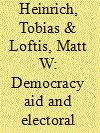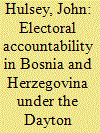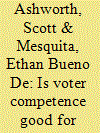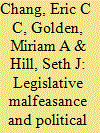|
|
|
Sort Order |
|
|
|
Items / Page
|
|
|
|
|
|
|
| Srl | Item |
| 1 |
ID:
121136


|
|
|
|
|
| Publication |
2012.
|
| Summary/Abstract |
When the economy in a single country contracts, voters often punish the government. When many economies contract, voters turn against their governments much less frequently. This suggests that the international context matters for the domestic vote, yet most research on electoral accountability assumes that voters treat their national economies as autarkic. We decompose two key economic aggregates-growth in real gross domestic product and unemployment-into their international and domestic components and demonstrate that voters hold incumbents more electorally accountable for the domestic than for the international component of growth. Voters in a wide variety of democracies benchmark national economic growth against that abroad, punishing (rewarding) incumbents for national outcomes that underperform (outperform) an international comparison. Tests suggest that this effect arises not from highly informed voters making direct comparisons but from "pre-benchmarking" by the media when reporting on the economy. The effect of benchmarked growth exceeds that of aggregate national growth by up to a factor of two and outstrips the international component of growth by an even larger margin, implying that previous research may have underestimated the strength of the economy on the vote.
|
|
|
|
|
|
|
|
|
|
|
|
|
|
|
|
| 2 |
ID:
163440


|
|
|
|
|
| Summary/Abstract |
Although foreign policies often fail to successfully promote democracy, over a decade of empirical research indicates that foreign aid specifically for democracy promotion is remarkably successful at improving the survival and institutional strength of fragile democracies. However, these measures cannot tell us how well democracy aid supports the central promise of democracy: accountable government. Since institutions can be subverted in various ways that undermine accountability, it is vital to know whether democracy aid supports accountability to assess its overall success. We provide evidence for this by analyzing incumbent turnover in elections, following poor economic performance—the economic vote—as a measure of voting to achieve performance accountability. In our analysis of over 1,100 elections in 114 developing countries between 1975 and 2010, we find distinct evidence that increasing receipt of democracy aid is associated with more economic voting. Results are robust to numerous alternative empirical specifications.
|
|
|
|
|
|
|
|
|
|
|
|
|
|
|
|
| 3 |
ID:
177178


|
|
|
|
|
| Summary/Abstract |
Being able to hold politicians accountable is the hallmark of democracy, and central to this is the notion that politicians can run for reelection. Most research on reelection incentives compare politicians who are term-limited with those who are not. These studies concentrate mostly on relatively senior politicians in candidate-centered electoral systems. This article leverages a quasi-natural experiment posed by the staggered implementation of the 2014 Mexican Electoral Reform, which lifted an eighty-year-old ban on reelection. The author conducts a difference-in-differences analysis of the hypothesis that reelection encourages legislators to focus more on policies with the highest “electoral yield”—namely, particularistic legislation. Applying a correlated topic model to a new collection of transcripts from 6,890 legislative sessions in 20 Mexican states between 2012 and 2018, this article presents compelling evidence that it does, that the effect is synchronized with the electoral cycle, and that it is larger when the legislators’ political horizons are longer.
|
|
|
|
|
|
|
|
|
|
|
|
|
|
|
|
| 4 |
ID:
154902


|
|
|
|
|
| Summary/Abstract |
Theories of electoral accountability predict that legislators will receive fewer votes if they fail to represent their districts. To determine whether this prediction applies to state legislators, I conduct two analyses that evaluate the extent to which voters sanction legislators who cast unpopular roll-call votes or provide poor ideological representation. Neither analysis, however, produces compelling evidence that elections hold most state legislators accountable. I discover that legislators do not face meaningful electoral consequences for their ideological representation, particularly in areas where legislators receive less media attention, have larger staffs, and represent more partisan districts. In a study of individual roll-call votes across 11 states, I furthermore find a weak relationship between legislators’ roll-call positions and election outcomes with voters rewarding or punishing legislators for only 4 of 30 examined roll calls. Thus, while state legislators wield considerable policymaking power, elections do not appear to hold many legislators accountable for their lawmaking.
|
|
|
|
|
|
|
|
|
|
|
|
|
|
|
|
| 5 |
ID:
142276


|
|
|
|
|
| Summary/Abstract |
This article examines the ways in which Bosnia's continuing governance problems are rooted in the relationship between voters and parties implied in the Dayton Accords. Political competition and the party system in Bosnia are influenced by the structure of government and electoral system in the Dayton Accords and subsequent regulations, which gives preference to a model of representation based on ethnic parties. This article examines the party system and nature of competition in order to show the weaknesses in this ethnic model of representation as well as the ongoing inability to establish alternative models such as broad multi-ethnic parties.
|
|
|
|
|
|
|
|
|
|
|
|
|
|
|
|
| 6 |
ID:
165423


|
|
|
|
|
| Summary/Abstract |
How do social networks moderate the way political information influences electoral accountability? We propose a simple model in which incumbent malfeasance revelations can facilitate coordination around less malfeasant challenger parties in highly connected voter networks, even when voters update favorably about incumbent party malfeasance. We provide evidence from Mexico of this mechanism by leveraging a field experiment in a context where the provision of incumbent malfeasance information increased support for incumbent parties, despite voters continuing to believe that challengers were less malfeasant than incumbents. Combining this experiment with detailed family network data, we show that—consistent with the model—the increase in incumbent party vote share due to information provision was counteracted by coordination around less malfeasant challengers in precincts with greater network connectedness. Individual-level data further demonstrate that networks facilitated explicit and tacit coordination among voters. These findings suggest that networks can help voters coordinate around information to help remove poorly performing politicians.
|
|
|
|
|
|
|
|
|
|
|
|
|
|
|
|
| 7 |
ID:
133945


|
|
|
|
|
| Publication |
2014.
|
| Summary/Abstract |
A long research tradition in behavioral political science evaluates the performance of democracy by examining voter competence. This literature got its start arguing that voters' lack of information undermines a defense of democracy rooted in electoral accountability. A more recent literature deepens the debate, with some authors claiming that voters effectively use cues to substitute for information about candidates and policies, and other authors claiming that voters are insufficiently rational to do so. We argue that, regardless of its conclusions about voter competence, this literature's single-minded focus on voter behavior is misguided. We use a sequence of formal models to show that traditional intuitions are incomplete because they ignore the effect that changes in voter behavior have on the equilibrium behavior of politicians. When this strategic interaction is taken into account, increases in voter information or voter rationality sometimes make democratic performance better and sometimes make democratic performance worse. One simply cannot assess the implications of voter characteristics for democratic performance without also studying how those characteristics affect the behavior of politicians.
|
|
|
|
|
|
|
|
|
|
|
|
|
|
|
|
| 8 |
ID:
095079


|
|
|
|
|
| Publication |
2010.
|
| Summary/Abstract |
Utilizing a unique data set from the Italian Ministry of Justice reporting the transmission to the Chamber of Deputies of more than the thousand requests for the removal of parliamentary immunity from deputies suspected of criminal wrongdoing, the authors analyze the political careers of members of the Chamber during the first eleven postwar legislatures (1948-94). They find that judicial investigation typically did not discourage deputies from standing for reelection in Italy's large multimember electoral districts. They also show that voters did not punish allegedly malfeasant legislators with loss of office until the last (Eleventh) legislature in the sample. To account for the dramatic change in voter behavior that occurred in the early 1990s, the investigation focuses on the roles of the judiciary and the press. The results are consistent with a theory that a vigilant and free press is a necessary condition for political accountability in democratic settings. An independent judiciary alone is ineffective in ensuring electoral accountability if the public is not informed of political malfeasance.
|
|
|
|
|
|
|
|
|
|
|
|
|
|
|
|
| 9 |
ID:
117544


|
|
|
|
|
|
|
|